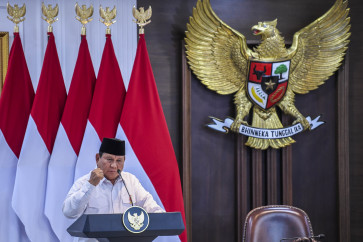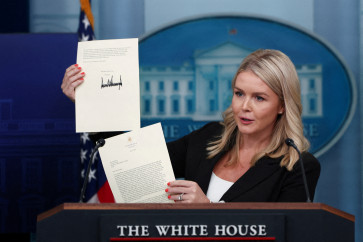Popular Reads
Top Results
Can't find what you're looking for?
View all search resultsPopular Reads
Top Results
Can't find what you're looking for?
View all search resultsAceh legislature mulls easing polygamy restrictions
Aceh’s regional legislative council is deliberating on a bylaw that would make it easier for men to be polygamous
Change text size
Gift Premium Articles
to Anyone
Aceh’s regional legislative council is deliberating on a bylaw that would make it easier for men to be polygamous.
The bylaw, which the council aims to pass before the end of the 2014-2019 legislative term in September, would allow men in the sharia-governed province to marry a second, third or fourth wife without the permission of their current wife or wives, as long as they meet certain criteria.
This is in contrast to the national 1974 Marriage Law, which requires the current spouse or spouses to approve their husband’s request to marry another woman.
Musannif, the head of the legislative council’s commission overseeing religious and cultural affairs, said the bylaw had been proposed by the Aceh provincial government, namely its Islamic sharia agency.
Besides polygamy, the bylaw also regulates other matters related to family law, such as marriage, divorce and inheritance.
Musannif said the bylaw’s polygamy articles were meant to address the prevalence of nikah siri (unofficial, unregistered marriages) in the province.
“This results in injustice toward women, whose rights as wives are nor protected, and also toward the children who are born in nikah siri,” he said.
The draft bylaw stipulates that men can apply to a Sharia council for a permit to marry an additional wife without spousal permission, as long as their current wife is unable to fulfill her “duties”, contracts an incurable disability or disease, or cannot provide the husband with offspring.
West Aceh Ulema Council (MPU) chairman Teungku Abdurrani Adian has expressed his support of the proposed bylaw.
“Polygamy is legal in Islam, but it has not been regulated in local bylaws. We [ulema] will support [the bylaw] if it is implemented,” Adian told Antara news agency on Saturday.
However, Aceh women’s rights activist Norma Manaloe said the easing of polygamy restrictions should not be a legislative priority, given the existence of other, more urgent issues.
“For example, according to our data, the number of domestic violence cases [in Aceh] has increased, including sexual violence and neglect,” Norma said. “Aceh also has other big problems that should be discussed, such as the eradication of poverty, the supply of drinking water and ensuring that public services are carried out well.”
She added that while polygamy is allowed in the Quran, it is also stringently restricted.
“The most important condition is fairness,” she said, adding that fairness should not just be understood in a narrow sense of sexual relations and money but also the feelings of the wives and children.
“If the councillors are using the Prophet [Muhammad’s] actions as a reference, they should further evaluate how and why the Prophet practiced polygamy,” Norma said.
Polygamy is a controversial topic in Indonesia; many conservative Muslim groups consider it to be allowed by Islam, but the public has generally taken a dim view of the practice.
A 2018 regional election survey from Jakarta-based pollster Indonesian Survey Institute (LSI), for instance, found that 81.4 percent of respondents in West Java would reject polygamous gubernatorial or vice-gubernatorial candidates.
Islamic preacher Abdullah Gymnastiar, better known as Aa Gym, also saw his popularity plummet following an announcement that he had taken a second wife in 2006.
Even residents of religiously conservative Aceh have raised their objections against lifting restrictions on polygamy.
“There is no such thing as fairness in polygamy because it concerns the emotions of both the first wife and the new wife,” said Nani, a resident of Keutapang, Aceh Besar regency. “I personally would not be able to go through life like that, even though it is allowed in religion.”
Nia, another Keutapang resident, agreed.
“It’s true that [polygamy] is allowed in Islam, but in my opinion, many people use that religious argument as an excuse to do bad things,” she said. (kmt)










